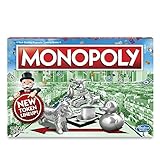
Predict your landings
Knowing what to expect when you roll the dice is an important part of succeeding at Monopoly.
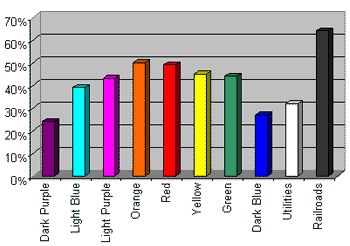
Most players finish a complete lap around the board in 5 turns.
You're likely to roll doubles once in those five turns (doubles happen about 17 percent of the time).
Count how many unmortgaged properties your opponents own and divide by 7. The resulting figure will tell you approximately how many rents you can expect to pay on your next circuit around the board.
Example: Your opponents collectively own 11 properties. You can expect to land on 1.6 (round off to 2) of them on your next circuit of the board.
Never forget the object of the game
The object is to bankrupt all opponents. To do so, you must be dedicated and make each decision with the aim of improving your chances and wiping out your opponents.
Show no mercy. If a player is down, eliminate him from the game.
Never give him an chance to make a comeback. Luck plays a key role in the game and luck can turn against you if you do not bankrupt a player as quickly as you can.
Know the cards
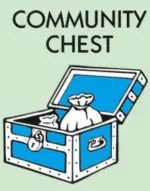
Keep track of which cards have been played. Since the deck is not shuffled, you can deduce which cards haven't come up. If you have a great memory, you'll know which cards to expect when they recycle.
A Chance card will, most likely, send you to another space. There are 16 Chance Cards: 10 of these cards move you elsewhere, 2 give you money (rewards), 2 take money away (penalties), 1 takes money away if you own buildings and 1 lets you get out of jail free.
A Community Chest Card will, most likely, give you a reward. There are 16 Community Chest Cards: 9 of these cards give you money (rewards), 3 take money away (penalties), 2 move you elsewhere, 1 take money away if you own building and 1 lets you get out of jail free.
Buy smart
Always buy the available properties when nobody owns one of the same group.
Always buy the available properties when the purchase would give you two or three of the same group.
Always buy the available properties when it blocks someone else from completing a set. Don't feel you must block a group if two other players each have a property of the group and also have more valuable groups split between them.
Keep track of the amount of money in the game
Each player starts with $1500.
On an average circuit of the board, prior to houses appearing, a player will make about $170. (this takes into account passing GO, earning rewards, paying penalties and taxes, and the effect of rents).
By knowing approximately cash an opponent has, you can know how far he or she can bid in an auction, how much rent he or she can afford to pay, or how many buildings he or she can purchase without mortgaging.
-
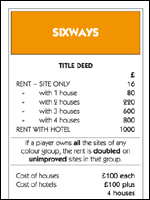
Orange Properties
The trio of orange properties is an excellent monopoly to own because of their relationship to Jail. So, always buy these properties when you can.
A roll of 6 or 8 (two of the most common rolls) from Jail lands you on an orange.
The Last Red
Remember that Illinois Avenue (last Red) is the square most often landed on (not including Jail) and The B&O Railroad and Go are also among those most landed-on.
Expensive Properties
The second set of properties on all four sides of the board is a better investment because houses and hotels cost the same to build as for the first set of properties, but the rent is higher.
Railroads or Utilities?
Railroads are better to own than utilities and Sort Line is the least useful railroad to own, because it is visited least often.
Buy Utilities if the opportunity arises (especially if you can get both of them).
-
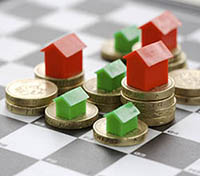
Get Houses as soon as possible
When you build houses, get to three of them as quickly as possible because the rent raises significantly between two and three houses.
e.g.: The rent on Illinois Avenue jumps from $300 to $750.
Cause a building shortage
If you're stuck with low-income properties, build to four houses quickly to create a building shortage (hurting other players' chances to build).
Twenty four of the 32 houses (or 6 of 12 hotels) could be tied up on just six properties.
Never move up to a hotel anywhere if the return of houses to the bank would enable an opponent to develop an expensive color group.
Example: the Yellow group has just been formed. There are only three houses in the bank, but six hotels. You own the light blues with four houses on each. Do not buy hotels. Doing so would give the player owning the Yellows an opportunity to build up to hotels on them.
Don't wait your turn
Don't forget that you can buy houses, make trades, etc., on your turn or between the turns of any other players.
Mortgaging
Avoid mortgaging properties where you own two or more of the properties.
If one property in a group is mortgaged, you cannot build on any of the properties in that group.

Income Tax
As a general rule, pay 10% if you haven't gone around the board three times. (Remember, you started with $1500 and will probably make $170 each time you go around the board. After three turns your assets should be over $2000).
Pay 10% later in the game only if you have paid heavy rents and are fairly sure your assets are below $2000.
Jail
Pay $50 and get out of jail as soon as possible early in the game while many properties remain unowned and undeveloped. You need to be in circulation.
But later on, you better stay as long as possible in jail because moving around is dangerous and can be expensive. This is especially important when certain dangerous color groups are heavily developed (Orange, for instance). By staying in Jail you avoid the chance of landing on such a group before an opponent lands on yours.
Relation to other players
Monopoly usually cannot be won without gaining the cooperation of players in trades and financial settlements. If you don't have a reasonable rapport with your opponents, you'll have a tough time making beneficial trades.
Present yourself as the type of player others won't mind losing to. Most players don't mind losing to opponents who are... diplomatic, gracious, knowledgeable, careful or considerate.
Most players don't like losing to: browbeaters, insulters, know-it-alls, careless players or inconsiderate players.
Continue Reading
